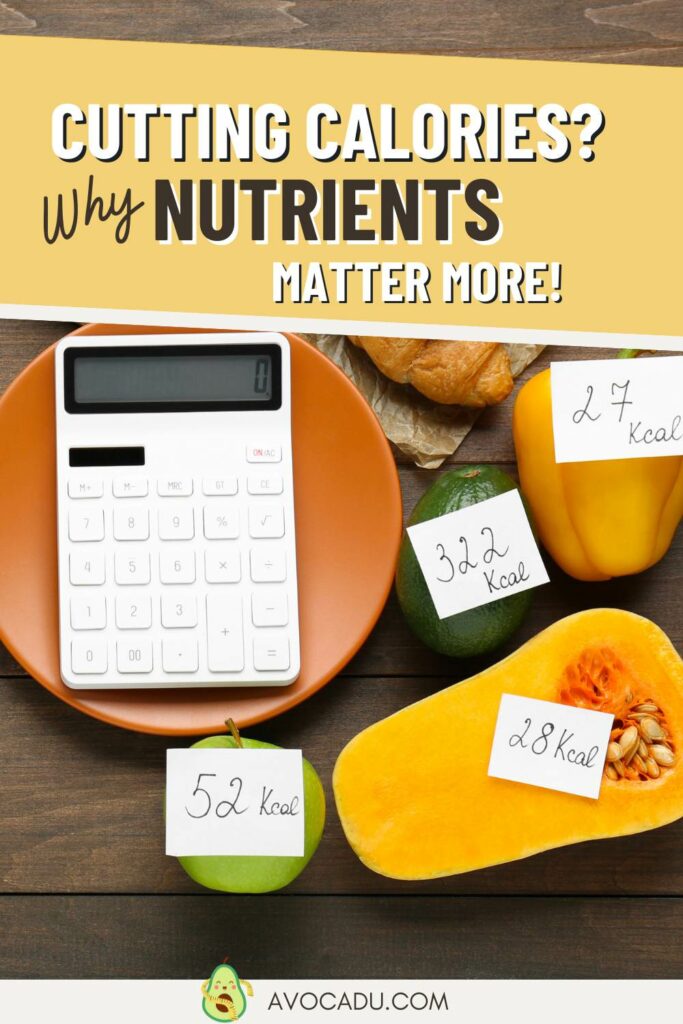Understanding Calories vs Nutrients: The Key to Sustainable Weight Loss
When it comes to losing weight in a healthy and sustainable way, understanding the distinction between calories vs nutrients is crucial. Often, the world of weight loss is flooded with myths and misinformation, leading many to follow diets that might not suit their bodies or lifestyles.
You’ve probably heard terms like “calorie counting” and “nutrient-dense foods” thrown around in discussions about dieting and weight loss. But what do these terms really mean, and why are they so important?
Calories, simply put, are the energy your body gets from the foods you eat, and they’re essential for powering everything from your morning workout to your nightly sleep.
However, the source of these calories matters immensely. That’s where nutrients come into play—those vital vitamins, minerals, proteins, fats, and carbohydrates that your body needs to function at its best.
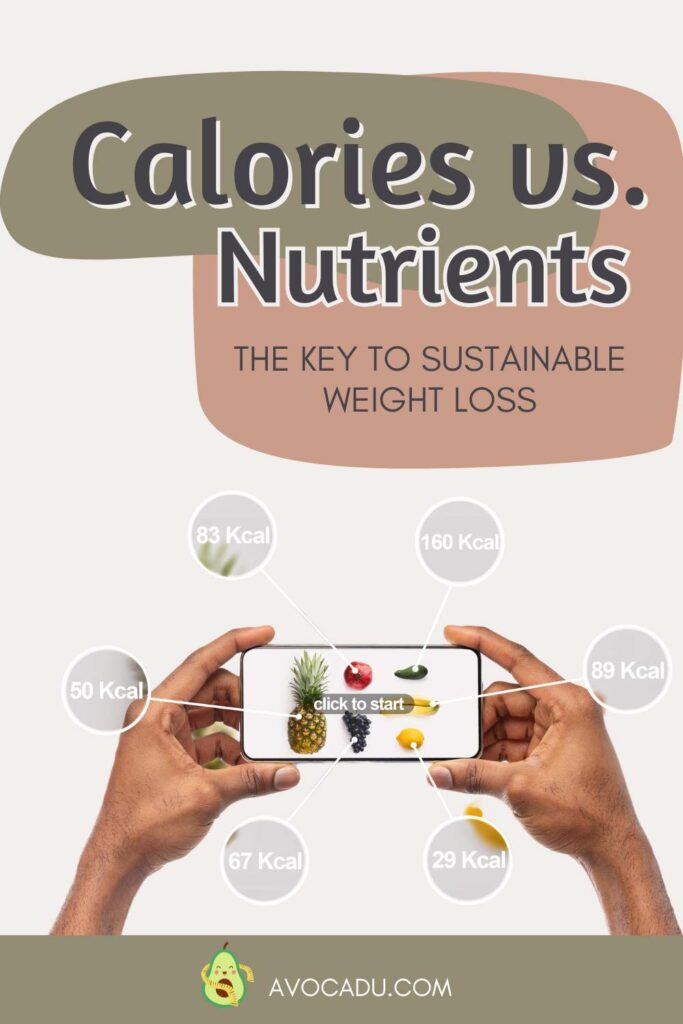
With the vast amount of dietary advice available, it can be challenging to sift through what’s helpful and what’s not. The goal here is to shed light on the true significance of calories and nutrients, going beyond the numbers to understand their impact on your health and weight loss efforts.
By gaining a deeper understanding, you’ll be well-equipped to make choices that not only help you shed pounds but also nourish your body and enhance your overall well-being.
This post may contain affiliate links, which helps keep this content free. Please read our disclosure for more info.
What Are Calories and Why Do They Matter?
Calories are your body’s energy currency, a measure of the energy that food provides to fuel all your bodily functions and activities. They are what keep you going, whether you’re just going about your daily tasks or pushing yourself in a high-intensity workout.
The food and drinks you consume are broken down, and the energy released is either used immediately by your body or stored for future use.
This energy is critical not just for movement and exercise but also for the unseen, yet vital, processes that keep you alive, such as digesting food, circulating blood, and regulating body temperature.
Every action, conscious or unconscious, that your body performs requires calories.
Yet, the situation becomes more complex when we realize that calories differ significantly in the nutritional value they offer. This distinction is what often makes calorie counting a complex practice.
For instance, 100 calories from a candy bar and 100 calories from a serving of vegetables don’t have the same effect on your body. The candy bar provides what’s often called ’empty calories’ – calories with little to no nutritional value – while the vegetables offer vitamins, minerals, and fiber on top of the energy they provide.
Understanding that calories are not just about quantity but also about quality is pivotal in managing weight effectively. Consuming the right amount of calories that your body needs, filled with the nutrients required for optimal health, is the cornerstone of a healthy lifestyle.
It’s not just about cutting calories; it’s about choosing the right sources for those calories. This approach ensures that your body gets what it needs to function at its best, supporting both weight loss and overall health.
The Importance of Nutrients Beyond Calories
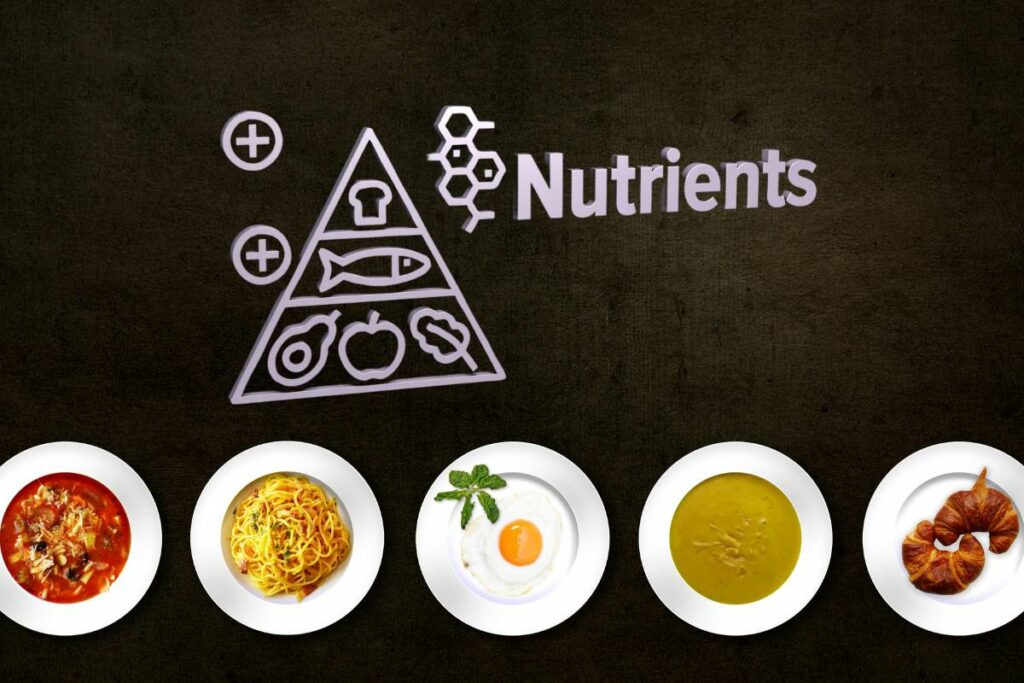
Nutrients, which encompass vitamins, minerals, proteins, fats, and carbohydrates, are more than just components of food; they are the essential elements that support every aspect of our bodily functions.
These building blocks of our diet do far more than provide energy; they are fundamental to our health, supporting everything from bone strength and brain function to heart health and immune response.
Vitamins and minerals, for example, play crucial roles in processes such as cell repair, immune system support, and the conversion of food into energy. They are involved in virtually every chemical reaction in the body.
A deficiency in certain vitamins or minerals can lead to significant health issues, emphasizing the importance of a balanced diet rich in these nutrients.
Proteins, often referred to as the body’s building blocks, are vital for building and repairing tissues, making enzymes and hormones, and supporting overall growth and development.
They are essential for maintaining muscle mass, which is particularly important during weight loss to ensure the body loses fat rather than muscle.
Fats, despite their often-negative reputation, are essential for brain health, energy, absorption of certain vitamins, and the production of hormones.
The key is to focus on healthy fats, such as those found in avocados, nuts, and olive oil, rather than saturated or trans fats.
Carbohydrates are the body’s primary energy source, especially for the brain and during physical activity. However, not all carbs are created equal.
Whole grains, fruits, and vegetables provide fiber and nutrients alongside their carbohydrate content, making them far superior choices to refined grains and sugars.
* Quick Note on Carbohydrates:
Though carbohydrates are a primary energy source in many diets, they’re not deemed essential. The ketogenic diet showcases this by significantly reducing carbs to promote fat burning for energy. This adaptation illustrates our body’s ability to thrive on different fuel sources, underlining the versatility of human metabolism.
When the focus is solely on calorie intake, without consideration for the sources of these calories, it’s easy to end up with a diet that is energy-dense yet nutrient-poor. This can lead not only to weight gain or difficulty losing weight but also to deficiencies that affect your overall health and well-being.
Consuming a balanced diet that emphasizes nutrient-dense foods ensures that you’re not just feeding your body, but nourishing it, supporting optimal health while managing weight effectively.
Balancing Calories with Nutrient Density for Weight Loss
The principle of nutrient density plays a pivotal role in crafting a diet that’s both effective for weight loss and beneficial for overall health.
Nutrient-dense foods are those that pack a high amount of vitamins, minerals, and other beneficial nutrients relative to their calorie content. These foods offer a powerful way to meet your nutritional needs without overloading on calories, making them crucial allies in weight management.
Incorporating nutrient-dense foods into your daily meals means you’re not just eating fewer calories; you’re ensuring that every calorie counts towards your body’s nutritional needs. This approach supports weight loss in several key ways:
- Enhanced Satiety: Foods high in nutrients often contain more fiber and protein, both of which are known for their ability to help you feel full and satisfied after eating. This fullness can last longer, helping to curb the urge to snack on less healthy options between meals.
- Reduced Cravings: By providing a steady supply of essential nutrients, nutrient-dense foods can help balance your body’s natural hunger signals and reduce cravings, particularly for sugary or fatty snacks that offer little nutritional value.
- Efficient Energy Use: With the right nutrients fueling your body’s processes, you’re likely to experience more stable energy levels throughout the day. This can encourage more physical activity, which is an important factor in maintaining a healthy lifestyle.
- Optimal Health Benefits: Beyond weight loss, a diet rich in nutrient-dense foods can enhance your overall health. These foods contribute to improved heart health, stronger bones, and a reduced risk of chronic illnesses such as diabetes and hypertension.
To effectively balance calories with nutrient density, focus on incorporating a variety of whole foods into your diet, such as fruits, vegetables, lean proteins, whole grains, and healthy fats. Each of these food groups brings its own set of vital nutrients to the table, contributing to a well-rounded and nutritious diet.
10 Practical Tips for a Balanced Diet
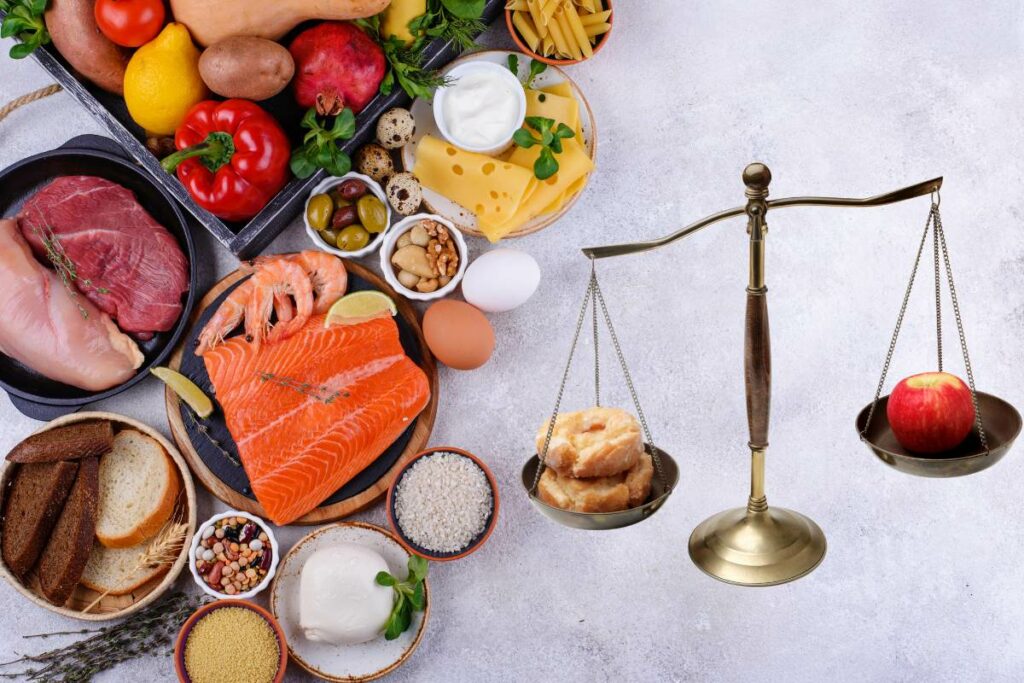
Adopting a balanced diet rich in nutrient-dense foods is a cornerstone of good health and effective weight management. Here are 10 practical tips to help you fine-tune your eating habits for optimal nutrition:
- Prioritize Whole Foods: Start by choosing whole, unprocessed foods whenever possible. Fruits, vegetables, whole grains, lean meats, and nuts are packed with essential nutrients that processed foods often lack. Whole foods are more satisfying, helping you eat less and feel fuller longer.
- Read Labels Carefully: When buying packaged foods, take a moment to read the nutrition labels. Opt for products with little to no added sugars, a short list of ingredients that are familiar and easily recognized, and devoid of artificial additives. Paying attention to serving sizes can also help you manage your calorie intake more effectively.
- Plan Your Meals: Take some time each week to plan your meals. This can help you ensure a good mix of nutrients across your meals and snacks and prevent last-minute, less nutritious food choices. Planning also makes grocery shopping more efficient and can help reduce food waste.
- Include a Variety of Colors: Fill your plate with a rainbow of low-carb fruits and vegetables. Different colors often indicate different nutrients, so by varying the colors on your plate, you’re more likely to get a broad spectrum of vitamins and minerals.
- Stay Hydrated: Drinking enough water is crucial for overall health and can aid in weight management by helping to keep you full and reducing the likelihood of mistaking thirst for hunger. Aim for at least half your body weight in ounces of water a day, or more if you’re active or it’s hot outside.
- Balance Your Macronutrients: Ensure that each meal includes a balance of carbohydrates, proteins, and fats. This balance can help sustain energy levels and satiety throughout the day. For example, pair complex carbs like quinoa or sweet potatoes with lean proteins and healthy fats from avocados or nuts.
- Practice Portion Control: Use measuring cups, spoons, or a kitchen scale to familiarize yourself with recommended serving sizes. Eating directly from large packages or containers can make it easy to consume more than you intend.
- Limit Added Sugars and Salt: Cut down on foods high in added sugars and salt to reduce your risk of chronic diseases and improve overall health. Instead, flavor your food with herbs, spices, and other natural seasonings.
- Cook at Home More Often: Preparing meals at home gives you control over the ingredients and cooking methods, allowing you to make healthier choices. Experiment with new recipes that emphasize whole, nutrient-dense foods.
- Listen to Your Body: Pay attention to hunger and fullness cues. Eating slowly and mindfully can help you recognize when you’re satisfied, preventing overeating.
By incorporating these tips into your daily routine, you can create a balanced diet that supports your health goals, provides your body with the nutrients it needs, and helps you manage your calorie intake effectively.
Common Pitfalls to Avoid

Navigating the path to a healthier lifestyle and weight loss involves being mindful of not just what you eat, but also how and when you eat it. Along the way, it’s easy to fall into certain traps that might seem like shortcuts to weight loss but can actually set you back.
Here are some common pitfalls to be aware of and strategies for avoiding them:
Misinterpreting Calorie-Free as Healthy
Just because a food or beverage is marketed as “calorie-free” doesn’t necessarily mean it’s a healthy choice. Many calorie-free options contain artificial sweeteners or additives that can have other health implications or even trigger cravings for more sugary foods.
Instead, focus on the overall nutritional value of your foods and drinks, aiming for natural, whole-food options whenever possible.
Overlooking the Quality of Calories
Focusing solely on the number of calories consumed, without considering the quality, is a mistake. 500 calories from nutrient-dense foods like vegetables, lean proteins, and whole grains have a vastly different impact on your body than 500 calories from sugary snacks or fast food.
Prioritize foods that are rich in nutrients to support your health and weight loss goals.
Forgetting About Portion Sizes
It’s easy to consume more calories than intended by overlooking portion sizes, even with healthy foods.
Use measuring tools or visual cues to ensure your portions align with your dietary needs. Remember, moderation is key to a balanced diet.
Underestimating the Impact of Liquid Calories
Beverages can contribute a significant number of calories to your daily intake without providing the same level of satiety as solid foods.
Sugary drinks, alcohol, and even some high-calorie coffee beverages can add up quickly. Opt for water, herbal teas, or black coffee to stay hydrated without the extra calories.
Ignoring the Importance of Fiber
Fiber plays a crucial role in weight loss by promoting feelings of fullness and improving digestive health, yet it’s often overlooked. Include plenty of fiber-rich foods in your diet, such as low carb fruits and vegetables, legumes, and whole grains, to help keep you satisfied and support your weight loss efforts.
Avoiding Fats Entirely
While it’s wise to monitor your intake of fats, healthy fats are essential for your body. They support cell growth, protect your organs, and help absorb certain nutrients.
Include sources of healthy fats, like avocados, nuts, seeds, and olive oil, in moderation.
The Road Ahead: Making Sustainable Changes
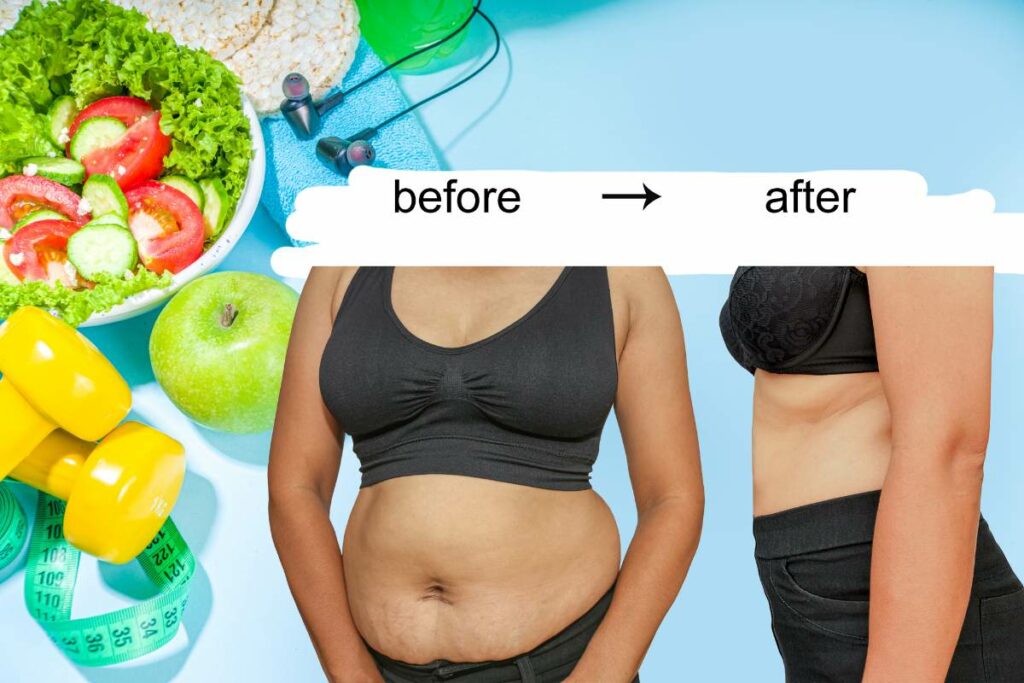
Making sustainable changes to your diet and lifestyle is a journey marked by gradual progress and learning from every step taken, including the missteps. It’s a process that demands patience, perseverance, and a positive attitude toward learning and growth.
Understandably, navigating this path can feel daunting at times, but with the right mindset and support, achieving your weight loss goals is entirely within reach. Here are some strategies to help you stay on course and maintain motivation:
Set Realistic Goals
Start with clear, achievable goals that motivate you. Whether it’s losing a specific amount of weight, eating more vegetables every day, or incorporating a daily walk into your routine, setting realistic targets can help keep you focused and avoid feeling overwhelmed.
Celebrate Small Victories
Recognize and celebrate your progress, no matter how small. Every healthy choice you make is a step in the right direction, so take time to acknowledge these victories. This positive reinforcement can boost your morale and motivation.
Find Your Support System
Having a support system as you navigate this journey can make a significant difference. Whether it’s friends, family, or a community of like-minded individuals, sharing your successes and challenges with others can provide encouragement and accountability.
Educate Yourself
Knowledge is power. Educating yourself about nutrition, exercise, and healthy lifestyle habits can empower you to make informed decisions that align with your goals.
The more you understand about your body and how it responds to different foods and activities, the better equipped you’ll be to make choices that support your health and well-being.
Be Kind to Yourself
Remember, setbacks are a part of the journey. Be kind to yourself when things don’t go as planned. Reflect on what you can learn from these experiences and how you can adjust your strategy moving forward. Self-compassion is a powerful tool for sustaining long-term motivation and commitment.
Embrace Flexibility
Life is unpredictable, and flexibility is key to maintaining your well-being through the ups and downs. Being too rigid with your diet or exercise regimen can lead to burnout or frustration. Allow yourself the flexibility to enjoy life’s pleasures in moderation.
Transitioning into a Structured Program
For those looking for a more structured approach to kickstart their journey, the 21-Day Fat Loss Program offers a guided pathway to making these sustainable changes.

This program is designed to help you understand the fundamentals of a healthy diet, exercise, and mindset that are essential for weight loss and overall health.
The 21-Day Fat Loss Program provides a comprehensive guide, including a diet plan, workouts, and motivational strategies, to support you in building healthy habits.
By focusing on achievable, incremental changes, the program helps pave the way for long-term success beyond the initial 21 days. It’s an excellent way to gain momentum and establish a foundation of habits that promote a healthier lifestyle.
Remember, the road to a healthier lifestyle is a marathon, not a sprint. It’s about making incremental changes that you can stick with over time, leading to lasting transformation. With the right approach, tools, and support, you can achieve your weight loss goals and enjoy a healthier, happier life.
